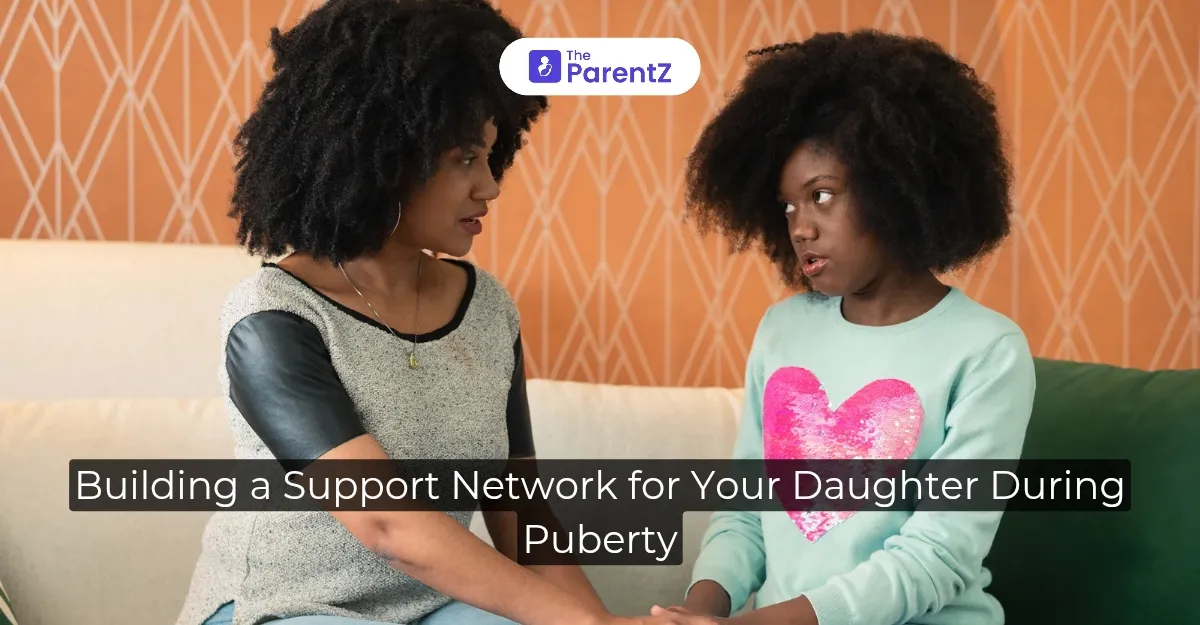Puberty is a time of major physical, emotional, and social changes. While it can be an exciting period of growth, it can also be overwhelming for your daughter. Having a strong support network can make a world of difference in helping her feel secure, understood, and confident.
As a parent, you play a central role in her support system but you don’t have to do it alone.
1. Be Her Primary Source of Support
Your daughter may be experiencing mood swings, self-doubt, or confusion about her changing body. Knowing she has you as a reliable source of love and understanding is crucial.
How to Be a Supportive Parent?
• Keep communication open – Encourage her to share her feelings without fear of judgment.
• Listen actively – Sometimes, she just needs to vent; offer reassurance rather than immediate solutions.
• Be patient and understanding – Mood swings and frustration are normal during puberty.
• Respect her need for privacy – While staying involved, allow her space to process emotions.
• Educate yourself – Stay informed about puberty-related changes so you can answer her questions with confidence.
Even if she pushes you away at times, remind her that you’re always there for her, no matter what.
2. Encourage Healthy Friendships
Friendships become more important during puberty, as your daughter may look to her peers for emotional support and validation.
Ways to Support Positive Friendships
• Encourage friendships with kind, supportive peers – Help her identify friends who uplift rather than bring her down.
• Teach her to set boundaries – If a friendship becomes toxic, guide her on how to step away.
• Host social activities – Organising small get-togethers at home can help her strengthen her friendships.
• Help her navigate conflicts – Offer advice on handling disagreements in a healthy way.
A strong circle of friends can provide comfort and reassurance when she feels misunderstood.
3. Introduce Trusted Mentors
Sometimes, daughters find it easier to open up to someone other than their parents. Mentors can offer guidance, share experiences, and provide valuable life lessons.
Potential Mentors Can Include
• Older siblings or cousins – They’ve been through puberty and can relate to her struggles.
• Aunts, uncles, or family friends – Trusted adults can offer advice in a different way than parents.
• Teachers or coaches – Positive role models in school or extracurricular activities can help build confidence.
• Community leaders – Religious leaders, counselors, or youth group mentors can offer additional emotional support.
Encourage her to seek guidance from people who share her values and have her best interests at heart.
4. Strengthen Family Bonds
A strong family unit provides emotional stability during puberty. When your daughter feels supported at home, she’s better equipped to handle challenges outside.
Ways to Build a Supportive Family Environment
• Have regular family meals – This creates opportunities for open conversations.
• Plan family outings – Spending quality time together fosters trust and connection.
• Encourage sibling support – If she has siblings, encourage them to be there for each other.
• Respect her individuality – Support her interests and hobbies without imposing expectations.
A loving home environment helps her feel safe and valued.
5. Connect Her with Supportive Online Communities
While social media can sometimes harm self-esteem, the right online communities can provide education, empowerment, and encouragement.
Safe Online Resources
• Websites and forums dedicated to teen health and wellness
• Social media groups that promote positive self-image and body confidence
• Educational videos from reputable organizations like Planned Parenthood or Girls Inc.
• Mental health apps that offer journaling, meditation, and stress management tips
Encourage her to engage with uplifting, age-appropriate online spaces while maintaining healthy screen time habits.
6. Help Her Find Professional Support When Needed
Sometimes, puberty-related emotional struggles go beyond what family and friends can help with. If your daughter is experiencing anxiety, depression, or persistent self-esteem issues, professional support may be beneficial.
Signs She May Need Extra Help
• Constant feelings of sadness or hopelessness
• Extreme anxiety or panic attacks
• Drastic changes in eating or sleeping habits
• Withdrawal from friends and activities she once enjoyed
• Thoughts of self-harm or worthlessness
Where to Seek Help?
• School counsellors – They can provide guidance on managing emotions and peer relationships.
• Therapists or psychologists – Professional mental health support can be life-changing.
• Support groups for teens – Being around others who share similar experiences can help her feel less alone.
Remind her that seeking help isn’t a sign of weakness but it’s a step toward emotional well-being.
7. Be a Role Model for Emotional Resilience
Your daughter will learn a lot about handling emotions from watching you. Demonstrating healthy ways to manage stress, communicate feelings, and navigate challenges can positively influence her own coping skills.
Ways to Set a Positive Example
• Show emotional awareness – Express your own feelings in a healthy and constructive way.
• Practice self-care – Encourage her to prioritise mental and physical well-being by modelling it yourself.
• Demonstrate problem-solving skills – Show her how to handle difficulties with patience and resilience.
• Apologise when necessary – Admitting mistakes teaches her that no one is perfect, and that’s okay.
By being a supportive, emotionally aware parent, you teach her valuable life skills that will benefit her beyond puberty.
Final Thoughts
Puberty can feel overwhelming, but your daughter doesn’t have to go through it alone. By surrounding her with a network of love, encouragement, and guidance, you help her feel more secure, confident, and understood.
Remember, being there for her doesn’t mean having all the answers, it simply means being present, listening, and reminding her that she is never alone in this journey. With the right support, she’ll grow into a strong, self-assured young woman who knows she’s valued and loved.








